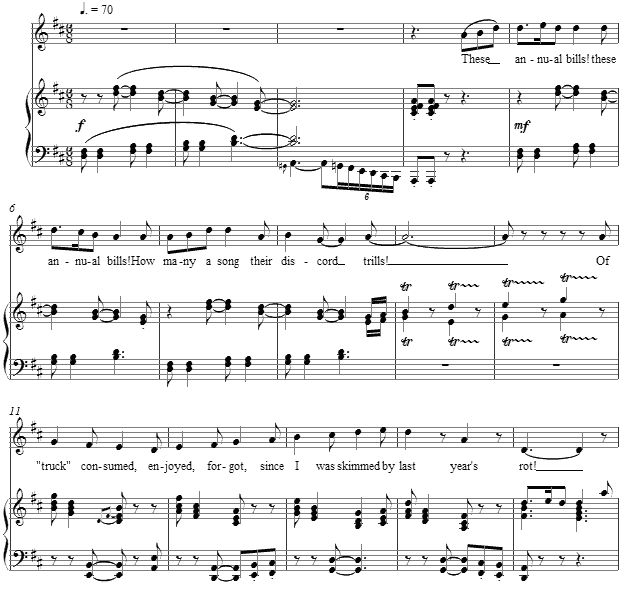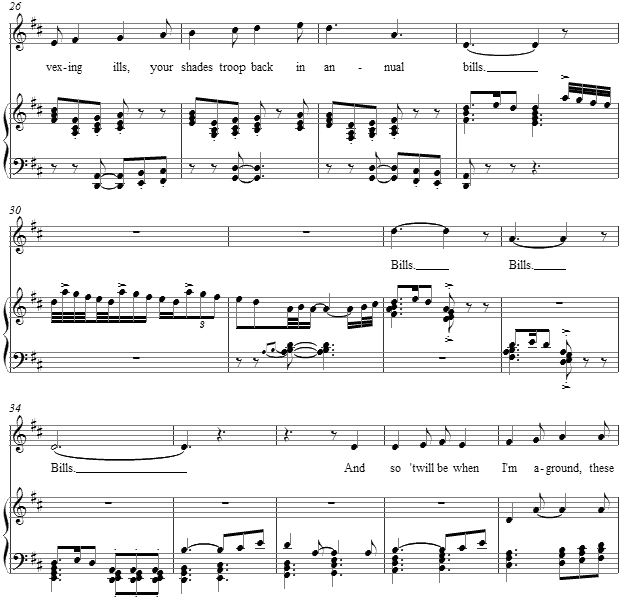Music and Texts of GARY BACHLUND
Vocal Music | Piano | Organ | Chamber Music | Orchestral | Articles and Commentary | Poems and Stories | Miscellany | FAQs
Bills - (2009)
Mark Twain
for medium voice and piano
These annual bills! these annual bills!
How many a song their discord trills
Of "truck" consumed, enjoyed, forgot,
Since I was skinned by last year's lot!
Those joyous beans are passed away;
Those onions blithe, O where are they?
Once loved, lost, mourned--now vexing ills
Your shades troop back in annual bills!
And so 'twill be when I'm aground
These yearly duns will still go round,
While other bards, with frantic quills,
Shall damn and damn these annual bills![ 3 pages, circa 1' 45" ]
Mark Twain
The old adage seems ever more true: Two things are certain, death and taxes. The definition of death in a more perceptive adage suggests it is the tax to be paid for vitality. Twain held forth on this, of course. But it was not only death which affected his life severely. It was debt. By 1894 Twain had found himself approximately $100,000 in debt, for which he wrote, "If I live I can pay off the last debt within four years, after which, at the age of sixty-four, I can make a fresh and unencumbered start in life." Thanks to assistance from his friend and head of Standard Oil in that era, Henry Rogers, Twain's copyrights were assigned to Harper's in exchange for an annual income and, with subsequent lectures in a worldwide tour, Twain did indeed pay off his debts."
The poem, the original title being "Those Annual Bills," therefore speaks of having enjoyed that which indebtedness had provided in the past, the bill coming due in the future long after the enjoyment had gone. This lesson must be relearned by every generation it seems, for which the biblical advice in Proverbs 22 passed through William Shakespeare to Benjamin Franklin and other voices seems profound to some while exceedingly old fashioned to those who rely on debt; "Neither a borrower nor a lender be." The original observes wisely, "The rich rules over the poor; and the borrower becomes servant to the lender." Twain fell into debt, and felt this truth first hand.
Judging by current political and economic trends around the world, whole nations have fallen into the same predicament and must find their way out again, as did Mark Twain.
The opening gesture appearing repetitively as an accompaniment figure is of upper and lower voices converging into a closed chord form. The trills mentioned in the text are echoed in the accompaniment as well and a succession of small progressions pulls downward the last gestures for the verse.
The title is reused as an additional lyric to bolster the disgust with bills -- the consequences of having wagered and lost in investments and acquiring unpaid debt. A flurry of downward soprano scales nags as introduction to this "unofficial" part of the text. As bridge material the first couplet of the poem's last stanza is broken away from the song form's chorus, and the last couplet then serves twice to fill out the text in the repetition and coda of the last chorus.
The score for Bills is available as a free PDF download, though any major commercial performance or recording of the work is prohibited without prior arrangement with the composer. Click on the graphic below for this piano-vocal score.


